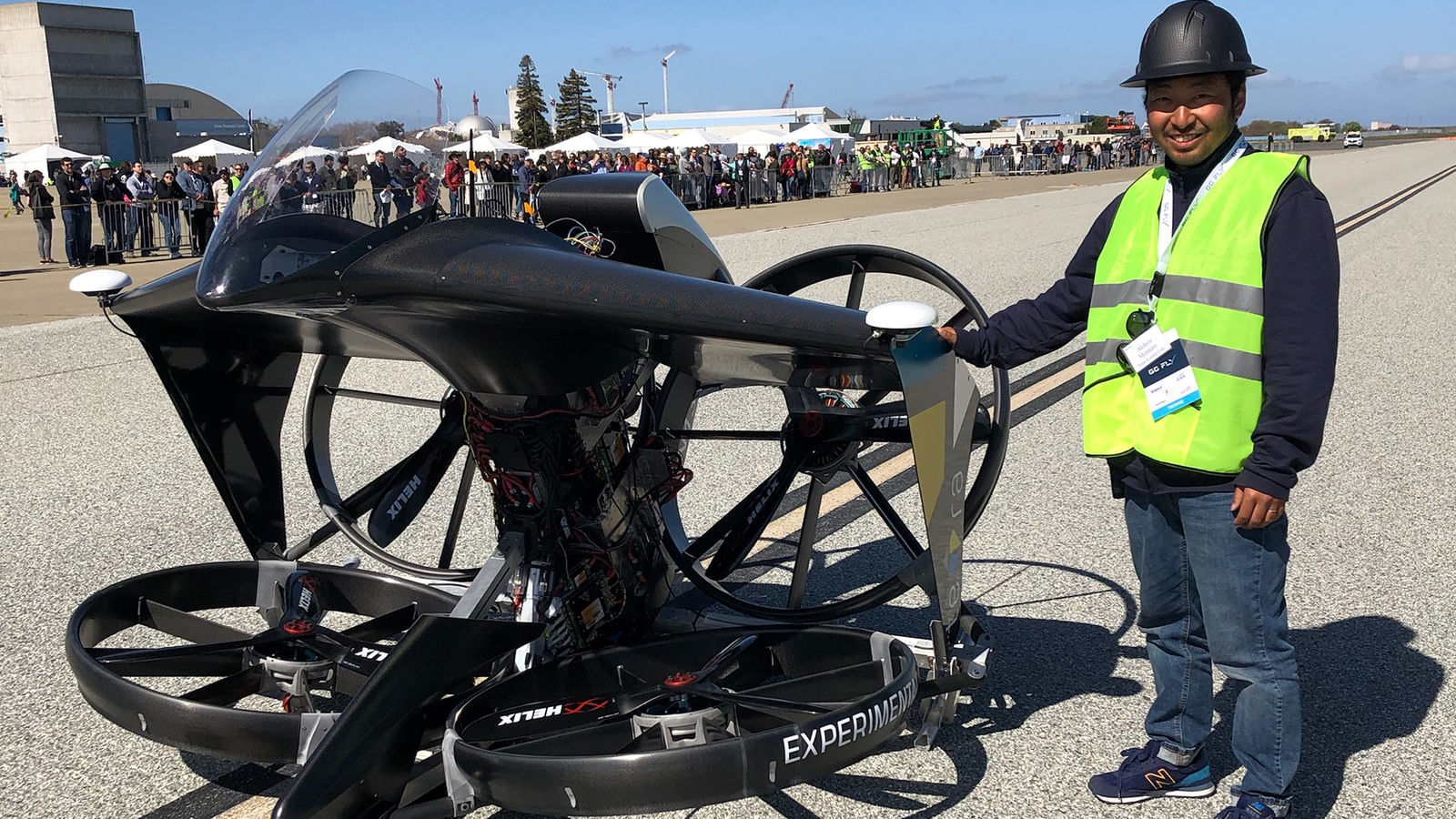Stay Up to Date
Submit your email address to receive the latest industry and Aerospace America news.
$1 million prize for carrying person (or mannequin) goes unclaimed, for now
This article’s last sentence was corrected after publication to show that teTra was not one of five teams that won $50,000 prizes in 2019 for aircraft prototypes.
MOUNTAIN VIEW, Calif. — A team of engineers from Japan who built a battery-powered, flying motorcycle received the $100,000 Disruptor prize Saturday in the corporate-sponsored GoFly competition meant to spark creation of a new breed of aircraft called personal flyers.
As impressive as that payday was for Team teTra, short for technology transportation, neither teTra nor the other three previously selected finalists won the $1 million grand prize. That award required a team to carry a 90-kilogram person or mannequin for 20 minutes while meeting an 87-decibel noise limit and size limit of 2.5 meters in length. None of the four finalists, nor the dozens of other teams that demonstrated their craft, attempted to carry a person or mannequin in the two-day gathering at NASA’s Ames Research Center in Silicon Valley.
An executive from Boeing, which put up the $1 million prize, delivered some good news to competitors who still aspire to do so. “That prize is still out there,” said Greg Hyslop, chief engineer of Boeing, indicating that the competition will continue at a date and venue to be decided.
Boeing and GoFly Prize officials will meet in the coming weeks to decide the rules for the extended competition.
On Friday, the four teams that had previously qualified for the final round carried or rolled their aircraft from their individual white tents to the Ames runway. The two teams with subscale models performed complex maneuvers, but teams with full-scale models moved less than a meter from the ground, taking short hops that lasted seconds. None took to the skies Saturday due to high winds.
Geoff Hunt, the senior vice president for engineering at Pratt & Whitney, said Team teTra won the award by challenging the status quo, delivering unique thinking and carefully considering safety, reliability, durability and systems integration.
Teams were enthusiastic about the decision to extend the competition because many felt they were within months of meeting the competition’s stringent size, endurance and noise requirements.
Vehicles must have had enough endurance to travel 32 kilometers safely at speeds of 55.5 kph. They had to remain aloft for 20 minutes on a single charge while maintaining emergency reserves for 10 additional minutes of operation.
The two full-sized vehicles, including the teTra 3 craft, remained aloft for no more than 30 seconds.
Several serious competitors suffered setbacks in the days leading up to the flyoff. Harmony, a Texas A&M University team, crashed its full-size Aria personal rotorcraft two weeks prior to the flyoff with no one aboard. Instead, on Friday, the team demonstrated a one-third scale model of the vehicle.
On Thursday, the pilot of DragonAir Aviation’s electric hoverboard took a hard fall when the craft crashed. The Florida-based team could not compete for the grand prize. On Saturday, DragonAir planned to conduct a flight demonstration with pilot Mariah Cain aboard, despite her hard fall, but high winds at Ames kept the vehicle grounded.
Gwen Lighter, GoFly Prize CEO and founder, said she was not disappointed that no one won the $1 million grand prize or additional $250,000 prizes for the quietest and smallest qualifying vehicles. “These teams have transformed aviation,” Lighter said. “Over 3,800 innovators have put their best into their personal flyers and into that grand challenge of making people fly.”
The GoFly competition began in 2017 with 854 teams from 103 countries. Ten teams, including teTra and Harmony whose vehicles flew Friday, won $20,000 prizes for aircraft design in 2018. Five teams won $50,000 prizes in 2019 for aircraft prototypes, including DragonAir and Harmony.
About Debra Werner
A longtime contributor to Aerospace America, Debra is also a correspondent for Space News on the West Coast of the United States.
Related Posts
Stay Up to Date
Submit your email address to receive the latest industry and Aerospace America news.




